Key takeaways:
- Fintech solutions enhance accessibility and convenience in managing finances, empowering users to take control of their financial lives.
- Technological advancements like robo-advisors and investment apps democratize financial services, making them available to a broader audience.
- Key features of effective fintech include user-friendly interfaces, strong security measures, and seamless integration with other financial services.
- Future trends in fintech focus on AI, decentralized finance (DeFi), and sustainable investment options, promising to reshape financial management further.
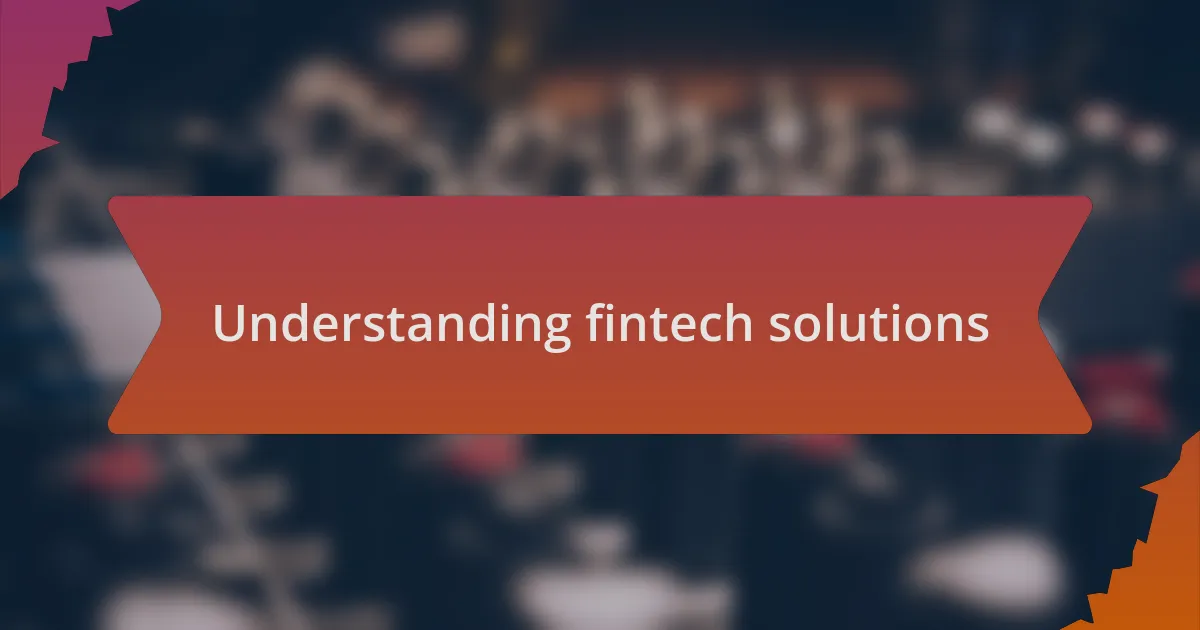
Understanding fintech solutions
Navigating the world of fintech solutions can feel overwhelming at first. I remember my initial confusion about how these digital platforms could actually streamline financial processes. When I started using apps for budgeting, it dawned on me how effectively technology could not only track my expenses but also help me save more intelligently.
What truly stands out to me is the flexibility fintech offers. For instance, I’ve experienced the convenience of peer-to-peer payment platforms that allow me to split dinner bills with friends instantly. Isn’t it fascinating how something as simple as a mobile app can eliminate awkward discussions about who pays what?
Reflecting on my interactions with fintech, it’s clear that these solutions are not just about speed—they’re about accessibility. I’ve seen friends who once felt intimidated by banking systems feeling empowered to take control of their finances through user-friendly interfaces. Doesn’t it make you think about the potential for fintech to reshape our understanding of money management?
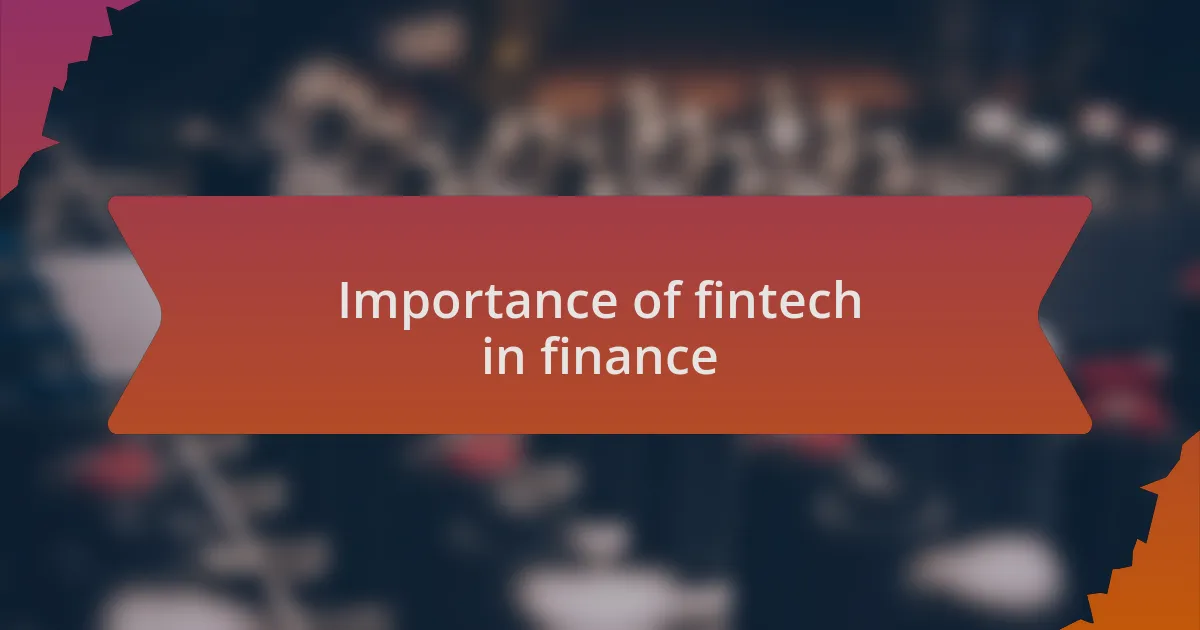
Importance of fintech in finance
The importance of fintech in finance cannot be understated. I still vividly recall the moment I discovered robo-advisors; the idea that algorithms could manage investments made me realize how inclusive finance could become. It’s amazing to think that smart technology can analyze data faster and more accurately than many traditional advisors, helping everyday people grow their wealth.
What I find most compelling about fintech is its role in democratizing access to financial services. I’ve talked to individuals who previously had limited banking options due to geography or income, and now they can access loans and investment opportunities right from their smartphones. Isn’t it empowering to know that technology is breaking down barriers and making financial services available to everyone?
Moreover, fintech is reshaping our expectations of speed and efficiency in financial transactions. I vividly remember a time I needed to transfer funds internationally for a family emergency. The traditional bank process was daunting and took days, while a fintech app took mere minutes. That experience opened my eyes to how these innovations not only simplify transactions but also provide peace of mind when it’s needed most. Isn’t that a game changer?
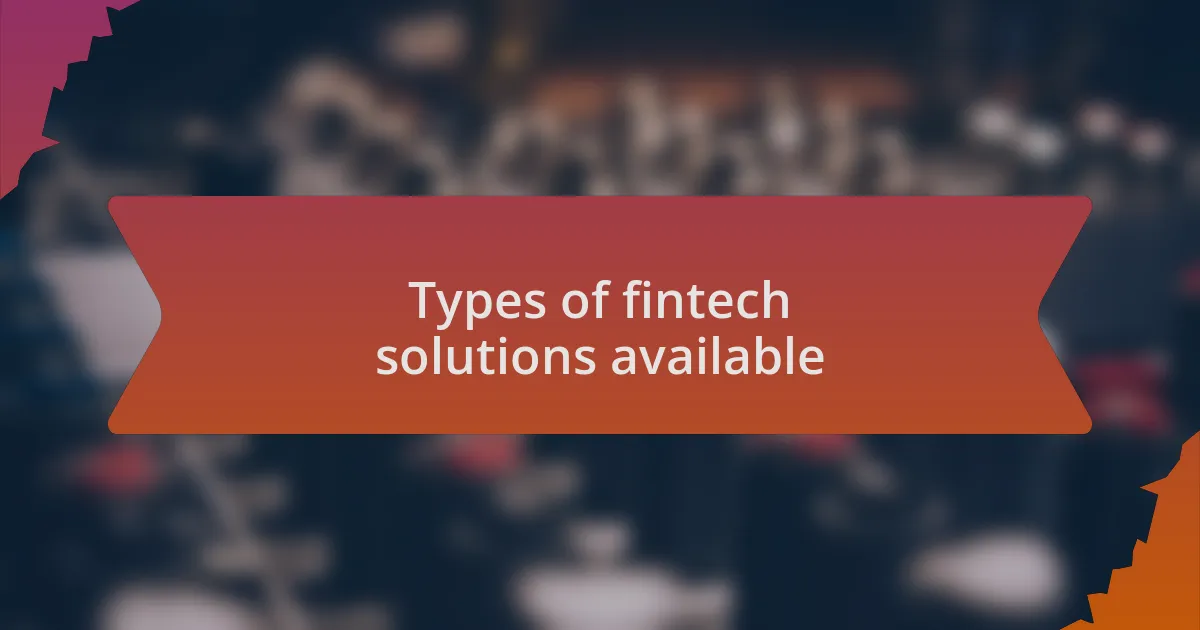
Types of fintech solutions available
Fintech solutions are diverse, addressing various needs within the financial sector. Payments platforms like PayPal and Venmo revolutionized how I view peer-to-peer transactions. Gone are the days of fumbling with cash; these apps have made splitting bills and sending money effortless, which I find incredibly convenient.
Lending platforms are another significant category of fintech solutions. When I first encountered companies like LendingClub, I was amazed by their ability to connect borrowers with investors directly. This approach not only streamlines the loan process but also often results in lower interest rates. It’s hard not to appreciate how quickly someone in need can access funds without navigating the lengthy traditional bank process.
Investment apps, such as Robinhood, have completely changed my attitude towards stock trading. The ease of buying and selling stocks from my mobile device is liberating. I remember the first time I made an investment; it felt like I was finally taking control of my financial future. Are we not all looking for simple ways to start our investment journeys? With these fintech solutions, it’s no longer just for the wealthy; anyone can participate in the market.
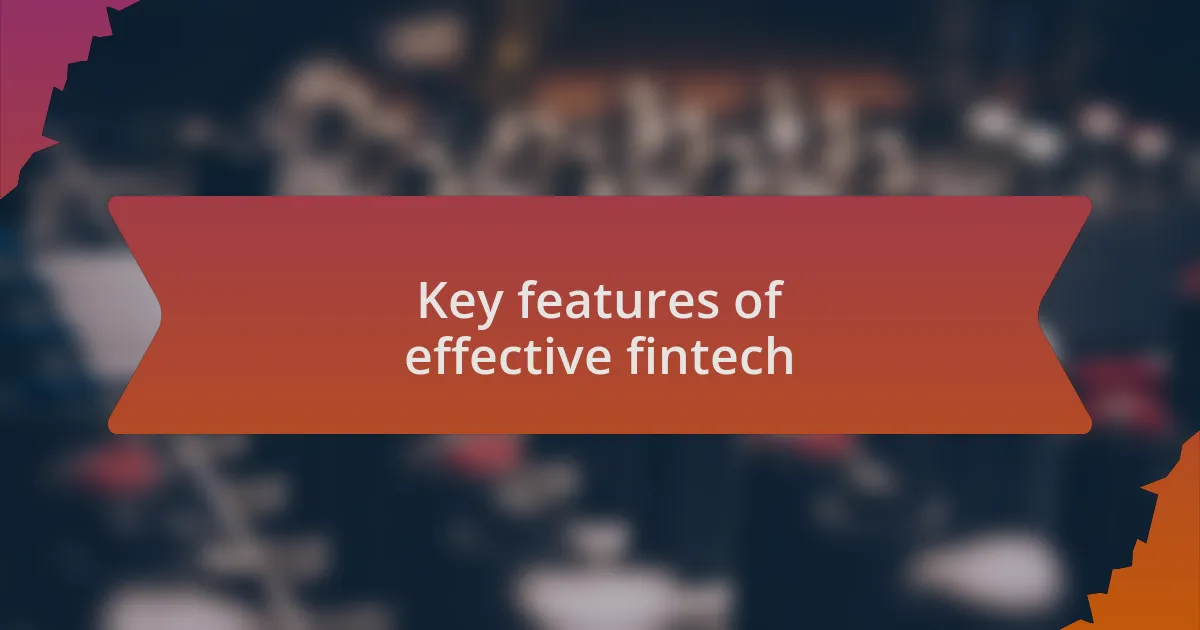
Key features of effective fintech
Effective fintech solutions share several key features that truly set them apart in today’s digital landscape. For instance, user experience is paramount. I remember the first time I tried a budgeting app that was cluttered and confusing; it soured my entire experience. In contrast, a clean, intuitive interface fosters trust and makes managing finances simpler and more enjoyable.
Another critical aspect is security. When I first started using fintech for transactions, I was understandably anxious about data breaches. However, knowing that reputable apps often prioritize advanced encryption and multi-factor authentication helped alleviate my concerns. Isn’t it comforting to feel that your financial information is safeguarded?
Lastly, connectivity plays a huge role in effective fintech solutions. I’ve found that integrating various services—from bank accounts to investment platforms—makes life so much easier. For instance, linking my banking app with an investment platform removed the guesswork from transferring funds, allowing me to focus on growing my investments instead. Who wouldn’t appreciate an ecosystem that simplifies financial management?
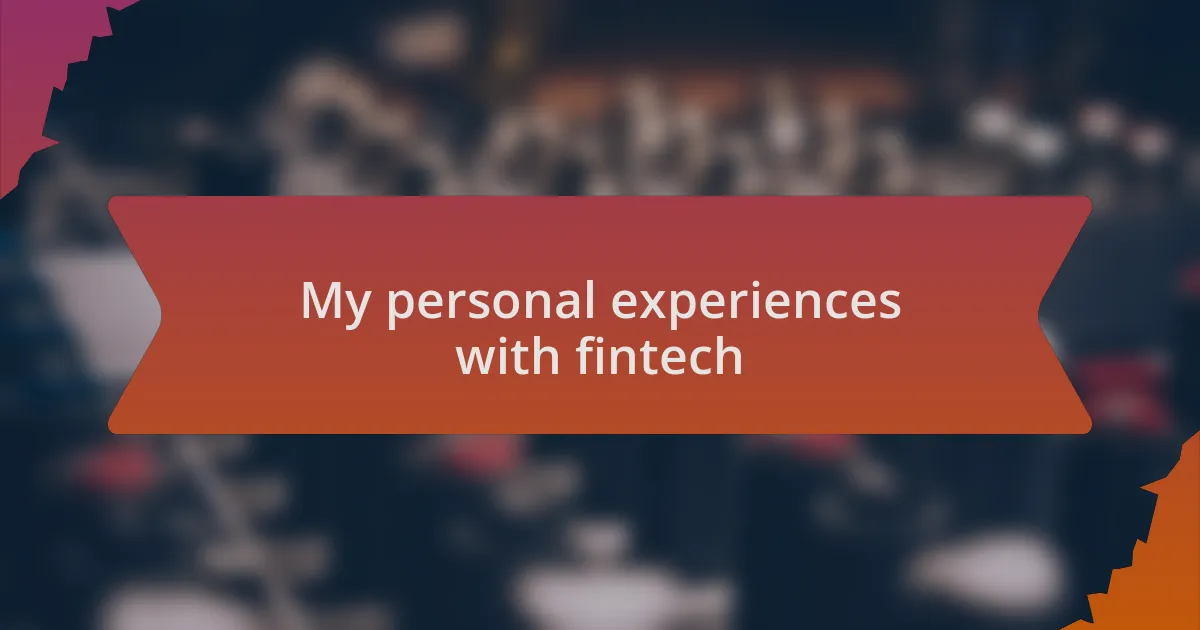
My personal experiences with fintech
My initial encounter with a peer-to-peer lending platform truly changed my perspective on lending and borrowing. It felt revolutionary to see individuals helping each other financially outside the traditional banking system. I remember feeling a mix of excitement and skepticism, wondering if it would really work; but when I funded my first loan and received repayments seamlessly through the app, it was like finding a new world of financial possibilities.
On the other hand, my experience with digital wallets has been a rollercoaster of convenience and occasional frustration. I fondly recall the first time I used one to pay at a café; the ease of tapping my phone instead of rummaging through my wallet was thrilling! Yet, there have been moments when I encountered hiccups during a transaction, leaving me feeling vulnerable. It’s a vivid reminder of how important it is for these solutions to be reliable.
I also appreciate how fintech solutions have altered my saving habits. Using an app that rounds up my purchases and saves the change has been surprisingly effective. It’s almost like being on autopilot with my finances, transforming small daily purchases into real savings without much effort on my part. Who knew that a little change could lead to substantial savings over time?
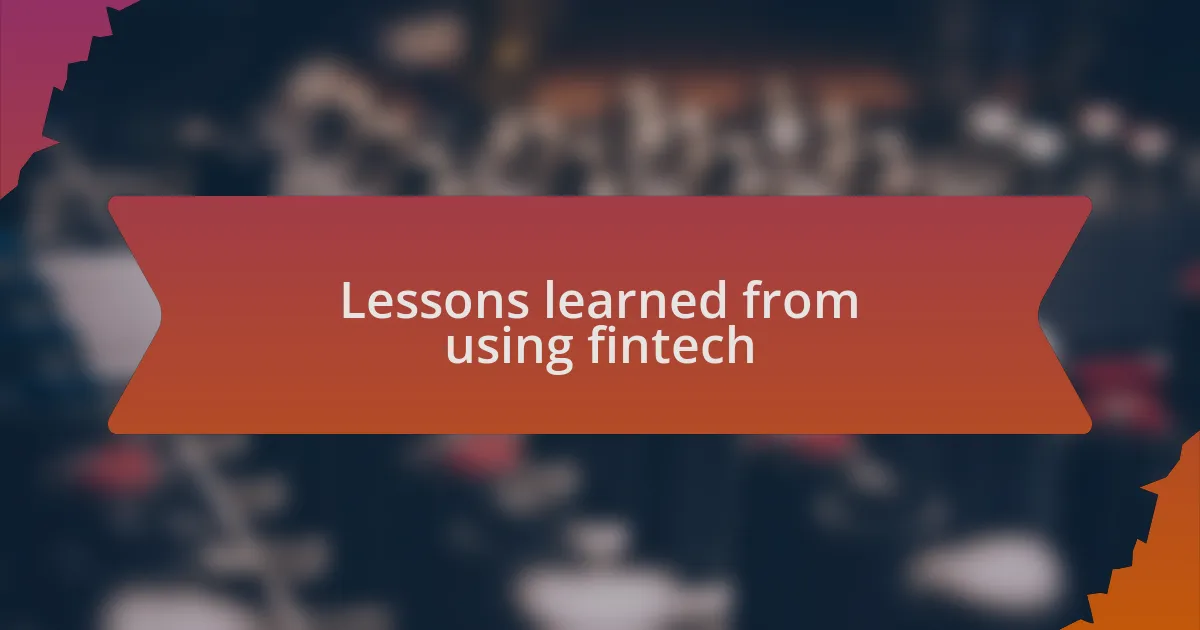
Lessons learned from using fintech
Using fintech has taught me to appreciate the sheer speed of transactions. I vividly remember a time when a late-night impulse purchase at an online store was finalized within seconds. This instant gratification brought joy, but it also made me question whether I was too quick to spend without considering my budget. It’s a learning curve, balancing convenience with mindfulness.
Another lesson emerged while navigating budgeting apps. I used one that visually tracked my spending in real time, leading me to discover patterns I had previously overlooked. It was eye-opening to see how often I splurged on coffee. This realization not only prompted me to explore more affordable habits but also deepened my awareness of where my money flows, highlighting the critical importance of visualizing finances.
Moreover, I’ve learned the value of security with fintech tools. After experiencing a minor data breach with one service, I became acutely aware of the importance of strong passwords and two-factor authentication. It was unsettling, but this event spurred me to adopt stronger security practices across all my accounts. It underscored a crucial point: with increased convenience comes the imperative to safeguard my financial health.
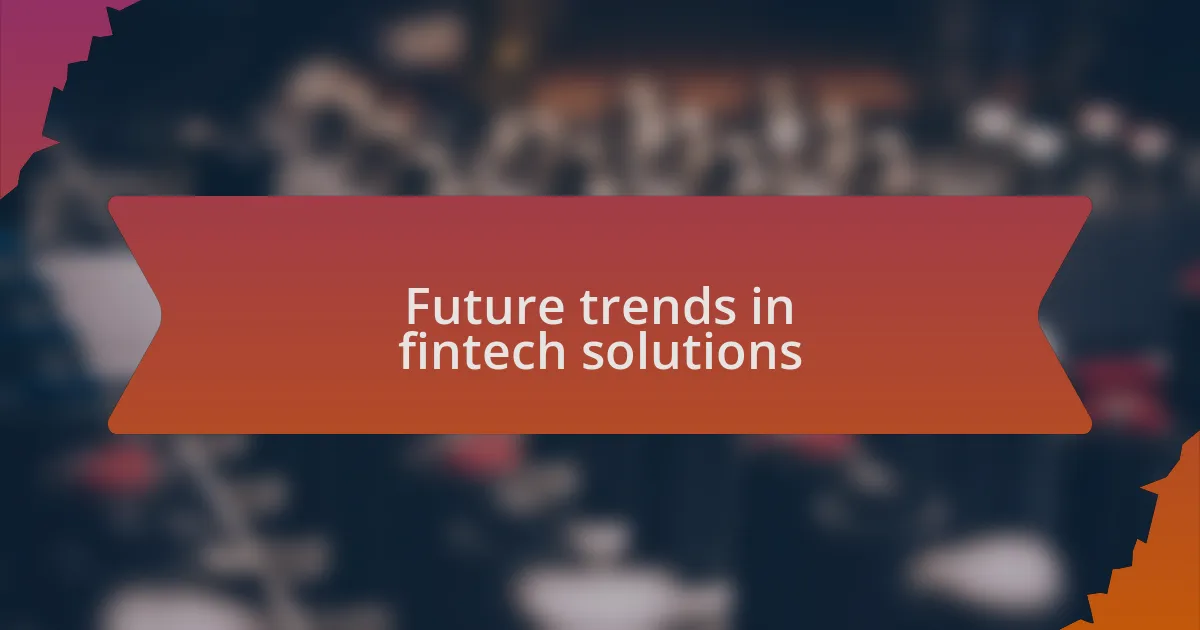
Future trends in fintech solutions
The future of fintech solutions is buzzing with the potential of AI and machine learning. I recently experimented with a personal finance app that used AI to analyze my spending habits and suggest tailored savings strategies. It felt like having a financial advisor in my pocket, guiding me toward smarter decisions. This leads me to wonder: how much could AI reshape my financial future in ways I never imagined?
We’re also seeing a rise in decentralized finance (DeFi), which aims to reform the traditional banking system. When I first learned about DeFi platforms, I was intrigued by the idea of complete control over my assets without intermediaries. It sparked excitement about the creative possibilities, but it also left me pondering the risks—how do I balance innovation with potential pitfalls in this evolving landscape?
Moreover, the emphasis on sustainability in fintech is growing. I had a conversation with a friend who is passionate about ethical investments, and it opened my eyes to how our financial choices can impact the environment. It made me think: as fintech evolves, will we see more tools that not only promote personal finance growth but also align with our values and support a more sustainable world?